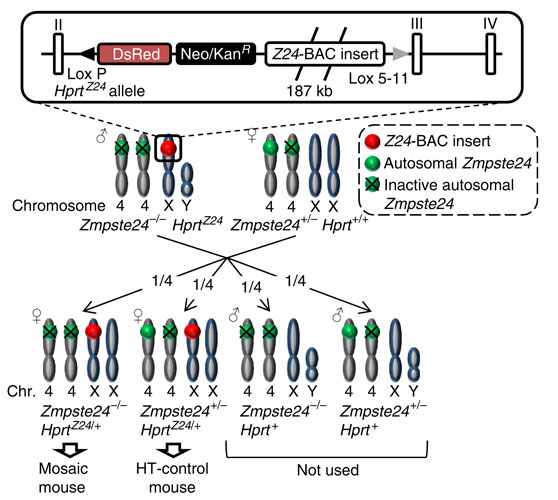Protein that accelerates age, brakes cancer

The team revealed that prelamin A, responsible for accelerated ageing in a condition called progeria, can prevent the progression of malignant or cancerous tumours. They achieved this by using mosaic mouse models, genetically modified mice bearing the protein prelamin A in half of their cells.
Ageing and cancer are intimately related processes, but their links are complex. The risk of developing tumours increases with age, but some of the mechanisms favouring ageing can also slow down the appearance and development of cancer. The results from this study represent an advance in the understanding of the underlying biological mechanisms that link age and cancer development, as well as possible new drug targets in the future.
“Mice with prelamin A in all their cells age more quickly and do not live longer than 4-5 months, which extremely hampers the study of cancer, as there is no time for the disease to fully develop.”
Jorge de la Rosa First author from Instituto de Medicina Oncológica y Molecular de Asturias
Researchers previously developed mice that have an underactive ZMPSTE24 gene that mimic the ageing disorder progeria to test for possible treatments. This causes the protein prelamin A to accumulate and in turn results in progeria. To better study the association of ageing and cancer development, the team developed a mosaic model where ZMPSTE24 was underactive in half of the cells and working normally in the other half of the cells.
“Mosaic mice, however, live as long as normal mice, up to two to three years, and they keep 50% of cells with prelamin A in all their tissues throughout lifespan, which has permitted us to study the effect of this protein on cancer.”
Juan Cadiñanos Lead author from the Instituto de Medicina Oncológica y Molecular de Asturias
The team found that the mosaic mice were completely healthy, without any of the physical deformities shown by mice with prelamin A-induced progeria: reduced size and weight, loss of fat, infertility and premature death. This suggests that it might not be necessary to correct the defects in all the cells of patients with progeria, but only some. These results provide hope for a successful treatment of patients with progeria in the future.
The team studied the development of tumours such as skin, lung and mouth cancers in the mosaic mice. Although the mosaic mice developed the same number of tumours as normal mice, they had fewer cancerous or malignant tumours – tumours cells that can break through the biological barriers that confine them and spread to other tissues in the body. They could also check the anti-invasive effect of prelamin A on human oral, lung and breast cancer cells.
Accumulation of prelamin A in cells appears not to stop or reduce the initiation and development of tumour growth, but greatly reduces the capacity of the tumour to become cancerous and spread to other parts of the body. The role prelamin A has to prevent the invasion of cancer suggests that ZMPSTE24 could be an attractive new target for cancer therapy.
“Our results are extremely exciting and offer great potential for the development of new therapies against both cancer and accelerated ageing disorders. These mouse models are invaluable for understanding the origins of disease and also to inspire new treatments against these debilitating conditions.”
Dr Allan Bradley Author from the Wellcome Trust Sanger Institute
More information
Funding
This work was supported by grants from Ministerio de Economía y Competitividad-Spain, European Union and the Wellcome Trust), as well as by Fundación María Cristina Masaveu Peterson, Fundación Centro Médico de Asturias, Obra Social Cajastur and Fundación Ramón Areces.
Participating Centres
- Instituto de Medicina Oncológica y Molecular de Asturias (IMOMA), 33193 Oviedo, Spain
- Departamento de Bioquímica y Biología Molecular, Instituto Universitario de Oncología del Principado de Asturias (IUOPA), Universidad de Oviedo, 33006 Oviedo, Spain.
- Wellcome Trust Sanger Institute, Genome Campus, Hinxton/Cambridge CB10 1SA, UK
- Department of Medicine II, Klinikum Rechts der Isar, Technische Universität München, 81675, München, Germany
- German Cancer Research Center (DKFZ), German Cancer Consortium (DKTK), 69120 Heidelberg, Germany
Publications:
Selected websites
The Wellcome Trust Sanger Institute
The Wellcome Trust Sanger Institute is one of the world’s leading genome centres. Through its ability to conduct research at scale, it is able to engage in bold and long-term exploratory projects that are designed to influence and empower medical science globally. Institute research findings, generated through its own research programmes and through its leading role in international consortia, are being used to develop new diagnostics and treatments for human disease.
The Wellcome Trust
The Wellcome Trust is a global charitable foundation dedicated to achieving extraordinary improvements in human and animal health. We support the brightest minds in biomedical research and the medical humanities. Our breadth of support includes public engagement, education and the application of research to improve health. We are independent of both political and commercial interests.


